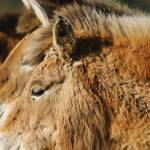Horse Height Gene Identified

A horse’s mature height is influenced by a combination of factors including genetic makeup and nutrition. At the Institute of Animal Breeding and Genetics of the University of Veterinary Medicine in Hannover, Germany, researchers have identified a single nucleotide polymorphism, or SNP, that has an important effect on height. The mutation on the LCORL gene limits how tall an equine will become, with the smallest horses or ponies showing the strongest expression of the gene.
The researchers conducted genetic analyses of 1,851 horses representing 42 different breeds. They found that all original Przewalski horses carried the mutation. Study of pony breeds uncovered evidence that the mutation appeared in full-sized equines during the domestication of horses in Europe. In Warmblood horses, the mutation was responsible for about half of the variations in wither height, with smaller horses being homozygous and those of medium size being heterozygous. None of the largest Warmblood horses were found to have the mutation.
The LCORL gene in humans has an effect on torso and hip length but is not a major regulator of mature height. In horses, however, the gene is important in determining height, though other genes are also involved. The University of Veterinary Medicine can provide a genetic test for expression of the gene, and the results of the test can be used by breeders to select horses for desirable traits related to mature height.








